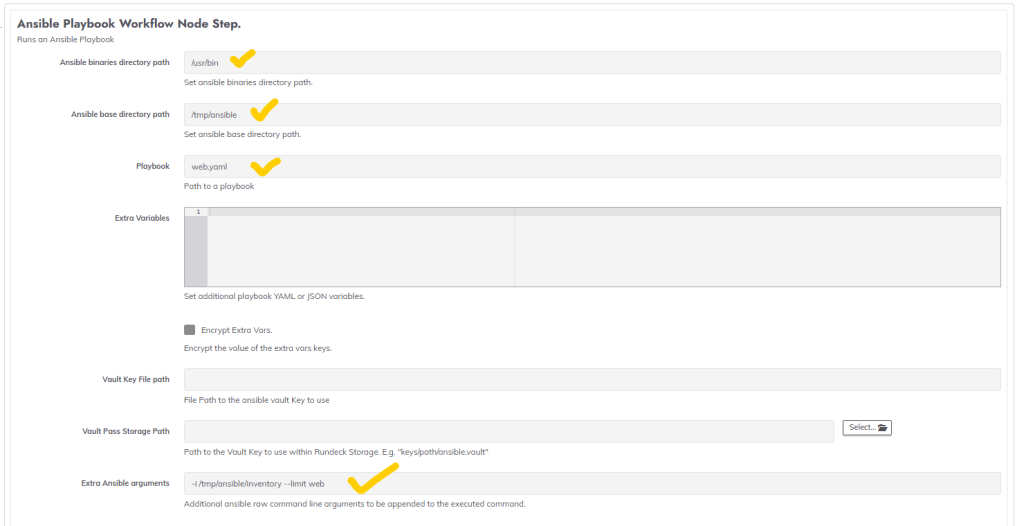Here’s a complete guide to running Ansible Playbooks using Rundeck, covering all supported methods, including what you’ve done, plus troubleshooting options and best practices.
✅ Goal
Run an Ansible Playbook (web.yaml) on remote hosts from Rundeck.
🧰 Prerequisites
- Ansible installed on Rundeck server (
ansible,ansible-playbook) - Playbook and inventory exist, e.g.:
/tmp/ansible/web.yaml/tmp/ansible/inventory
- Hosts reachable via SSH (key-based preferred)
- Rundeck has access to private key
✅ Methods to Run Ansible from Rundeck
✅ Method 1: Ansible Plugin (Node Step or Workflow Step)
Rundeck Plugin: Ansible Plugin for Rundeck
Best for: Structured jobs with SSH auth and node filtering.
Configuration
- Plugin Step Type: Ansible Playbook Workflow Node Step
- Playbook:
web.yaml - Inventory:
-i /tmp/ansible/inventory - Auth: Private key or SSH password
- User:
ubuntu - Extra vars (optional):
foo=bar - Set:
Use become: Yes(if needed)
🔍 Troubleshooting
- Set Node Filter to
.*(orname: .*) to apply job globally - Rundeck will pass
--limit <node>unless you’re careful - Inventory must include same hostnames/IPs as Rundeck nodes
Scree -1



#inventory code
more inventory
[web]
65.2.153.2
52.66.236.156
13.232.137.62
13.201.133.240
[db]
3.7.65.62
#web.yaml
---
- name: Update web servers
hosts: web
tasks:
- name: Install Apache in ubuntu
ansible.builtin.apt:
name: "git"
state: latest
- name: Copy index.html
ansible.builtin.copy:
src: index.html
dest: /tmp/index.html
Code language: PHP (php)✅ Method 2: Ansible as Command Step (Central Execution)
Run centrally from Rundeck server (not per node). This avoids node filtering issues.
Example
ansible-playbook -i /tmp/ansible/inventory /tmp/ansible/web.yaml -u ubuntu -b --private-key=/tmp/ansible/key.pem
Code language: JavaScript (javascript)Steps
- Add a Command Step
- Shell command as above
- Optional: Make key available using Secure Option
✅ When to Use
- You don’t need per-node execution
- Want Rundeck to just centrally launch playbooks
✅ Method 3: Script Step with Arguments
Same as Method 2, but using a bash script.
Example
Create script /tmp/run_ansible.sh:
#!/bin/bash
ansible-playbook -i /tmp/ansible/inventory /tmp/ansible/web.yaml -u ubuntu -b --private-key=/tmp/ansible/key.pem
Code language: JavaScript (javascript)Set Rundeck step type: Script file or inline
✅ Method 4: Ansible Ad-Hoc Step (Ansible Plugin)
You can also use:
Ansible Ad-Hoc Command Node Step- For one-liner tasks (e.g.,
apt update,ping,copy)
Example module: ping, shell, copy
✅ Method 5: Job with Embedded Inventory (YAML)
In Rundeck Project configuration, embed static inventory.
Example:
[web]
192.168.1.10 ansible_user=ubuntu
Then playbook can use hosts: web, and Rundeck calls it with --limit to match that.
✅ Method 6: Dynamic Inventory Integration
Use AWS/GCP inventory plugin or a custom dynamic inventory script.
Steps:
- Create a script like
aws_ec2.pyor a custom script - In Ansible arguments:
-i /tmp/ansible/my_dynamic_inventory.py - Make sure script is executable and returns correct JSON
🧪 Bonus: Add a Debug Step Before Playbook
Add a shell step before Ansible call:
ansible -i /tmp/ansible/inventory web --list-hosts
Code language: PHP (php)This lets you verify what Ansible sees at runtime.
🧾 Sample Rundeck Job YAML (Centrally Executed)
- defaultTab: nodes
description: Run Ansible playbook centrally
executionEnabled: true
id: 1234-ansible-job
loglevel: INFO
name: run-ansible-central
nodeFilterEditable: false
scheduleEnabled: true
sequence:
commands:
- description: Run Ansible centrally
exec: ansible-playbook -i /tmp/ansible/inventory /tmp/ansible/web.yaml -u ubuntu -b --private-key=/tmp/ansible/key.pem
nodefilters:
dispatch:
threadcount: 1
keepgoing: false
filter: ".*"
Code language: JavaScript (javascript)✅ Summary Table
| Method | Description | Best Use Case |
|---|---|---|
| 🔌 Plugin (Node Step) | Uses Rundeck Ansible plugin to run playbook on matched nodes | When your inventory matches Rundeck nodes |
| 🖥️ Command Step | Runs Ansible centrally from Rundeck server | For single control execution |
| 🧾 Script Step | Shell script wraps Ansible call | Repeatable, customizable |
| ⚡ Ad-Hoc Step | Use Ansible module like ping or shell | For one-time actions |
| 📂 Embedded Inventory | Static inventory within project | When inventory doesn’t change |
| 🔁 Dynamic Inventory | External inventory script (AWS, GCP, etc.) | For cloud infra or frequent host changes |
I’m a DevOps/SRE/DevSecOps/Cloud Expert passionate about sharing knowledge and experiences. I have worked at Cotocus. I share tech blog at DevOps School, travel stories at Holiday Landmark, stock market tips at Stocks Mantra, health and fitness guidance at My Medic Plus, product reviews at TrueReviewNow , and SEO strategies at Wizbrand.
Do you want to learn Quantum Computing?
Please find my social handles as below;
Rajesh Kumar Personal Website
Rajesh Kumar at YOUTUBE
Rajesh Kumar at INSTAGRAM
Rajesh Kumar at X
Rajesh Kumar at FACEBOOK
Rajesh Kumar at LINKEDIN
Rajesh Kumar at WIZBRAND
Find Trusted Cardiac Hospitals
Compare heart hospitals by city and services — all in one place.
Explore Hospitals
